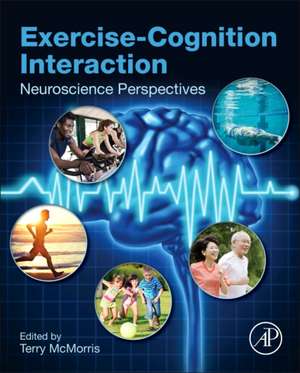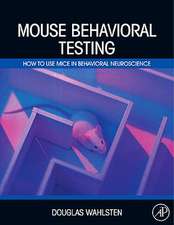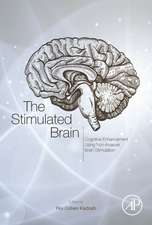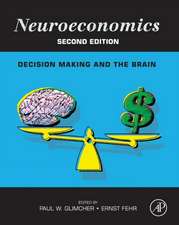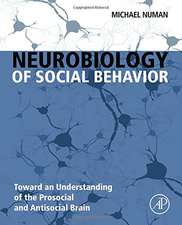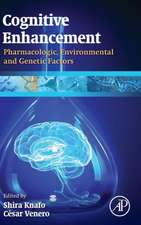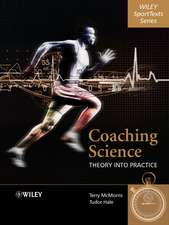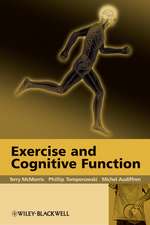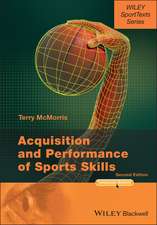Exercise-Cognition Interaction: Neuroscience Perspectives
Editat de Terry McMorrisen Limba Engleză Hardback – 5 feb 2016
This book provides an overview of the research into these effects, from theoretical research through current studies that emphasize neuroscientific theories and rationales. It addition, users will find a thorough examination of the effects of exercise interventions on cognitive functioning in special populations, including the elderly, children, and those suffering from a variety of diseases, including schizophrenia, diabetes, and an array of neurological disorders.
With contributions from leading researchers in the field, this book will be the go-to resource for neuroscientists, psychologists, medical professionals, and other researchers who need an understanding of the role exercise plays in cognitive functioning.
- Provides a comprehensive account of how exercise affects brain functioning, which in turn affects cognition
- Covers both theory and empirical research
- Presents a thorough examination of the effects of exercise interventions on cognitive functioning in special populations, including the elderly, children, and those suffering from a variety of diseases
- Examines neurochemical, psychophysiological, and genetic factors
- Covers acute and chronic exercise
Preț: 586.69 lei
Preț vechi: 810.69 lei
-28% Nou
Puncte Express: 880
Preț estimativ în valută:
112.28€ • 115.83$ • 95.03£
112.28€ • 115.83$ • 95.03£
Carte tipărită la comandă
Livrare economică 25 februarie-11 martie
Preluare comenzi: 021 569.72.76
Specificații
ISBN-13: 9780128007785
ISBN-10: 0128007788
Pagini: 504
Dimensiuni: 191 x 235 x 30 mm
Greutate: 1.18 kg
Editura: ELSEVIER SCIENCE
ISBN-10: 0128007788
Pagini: 504
Dimensiuni: 191 x 235 x 30 mm
Greutate: 1.18 kg
Editura: ELSEVIER SCIENCE
Public țintă
Researchers and graduate students in neuroscience, cognitive neuroscience, general psychology, occupational psychology, medicine, developmental neuroscience, and gerontologyCuprins
1. History of Research into the Acute Exercise-Cognition Interaction
2. History of Research into the Chronic Exercise-Cognition Interaction
3. Animal Models of the Exercise-Brain Interaction
4. Beyond the Catecholamines Hypothesis for an Acute Exercise-Cognition Interaction: A Neurochemical Perspective
5. Acute Exercise and Event-Related Potential: Current Status and Future Prospective
6. Acute Exercise and Cognition: Effects of Cerebral Oxygenation and Blood Flow
7. Reticular Activation Hypofrontality Theory
8. The Evidence for a Neurochemical Rationale for a Chronic Exercise-Cognition Interaction
9. The Chronic Exercise-Cognition Interaction: fMRI Research
10. The Chronic Exercise-Cognition Interaction: EEG Research
11. Effects of Fitness on the Exercise-Cognition Interaction
12. ‘"Cogito ergo sum" or "ambulo ergo sum"? New Perspectives in Developmental Exercise and Cognition Research
13. Acute Exercise and Cognition in Children and Adolescents: The Roles of Testosterone and Cortisol
14. The Chronic Exercise-Cognition Interaction in the Elderly
15. The Chronic Exercise-Cognition Interaction and Parkinson’s Disease
16. The Chronic Exercise-Cognition Interaction and Dementia and Alzheimer’s Disease
17. The Chronic Exercise-Cognition Interaction and Diabetes
18. The Chronic Exercise-Cognition Interaction and Attention Deficit Hyperactivity Disorder
19. The Chronic Exercise-Cognition Interaction and Breast Cancer Survivors
20. The Chronic Exercise-Cognition Interaction and Cardiovascular Risk Factors
21. The Chronic Exercise-Cognition Effect in Overweight and Obese Children
22. Exercise-Cognition Interaction: State of the Art and Future Research
2. History of Research into the Chronic Exercise-Cognition Interaction
3. Animal Models of the Exercise-Brain Interaction
4. Beyond the Catecholamines Hypothesis for an Acute Exercise-Cognition Interaction: A Neurochemical Perspective
5. Acute Exercise and Event-Related Potential: Current Status and Future Prospective
6. Acute Exercise and Cognition: Effects of Cerebral Oxygenation and Blood Flow
7. Reticular Activation Hypofrontality Theory
8. The Evidence for a Neurochemical Rationale for a Chronic Exercise-Cognition Interaction
9. The Chronic Exercise-Cognition Interaction: fMRI Research
10. The Chronic Exercise-Cognition Interaction: EEG Research
11. Effects of Fitness on the Exercise-Cognition Interaction
12. ‘"Cogito ergo sum" or "ambulo ergo sum"? New Perspectives in Developmental Exercise and Cognition Research
13. Acute Exercise and Cognition in Children and Adolescents: The Roles of Testosterone and Cortisol
14. The Chronic Exercise-Cognition Interaction in the Elderly
15. The Chronic Exercise-Cognition Interaction and Parkinson’s Disease
16. The Chronic Exercise-Cognition Interaction and Dementia and Alzheimer’s Disease
17. The Chronic Exercise-Cognition Interaction and Diabetes
18. The Chronic Exercise-Cognition Interaction and Attention Deficit Hyperactivity Disorder
19. The Chronic Exercise-Cognition Interaction and Breast Cancer Survivors
20. The Chronic Exercise-Cognition Interaction and Cardiovascular Risk Factors
21. The Chronic Exercise-Cognition Effect in Overweight and Obese Children
22. Exercise-Cognition Interaction: State of the Art and Future Research
